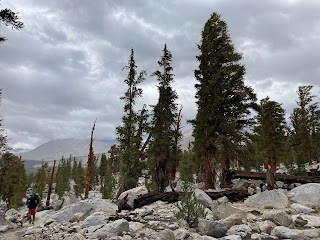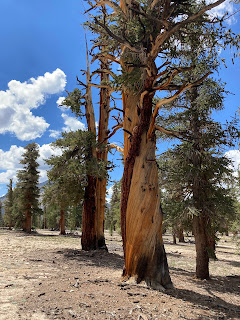Originally I was going to call this post "Trees", but realized I have posted plenty of pictures of pine and oak and cedars that I knew. Not so much these.
Frankly, I am not sure what these are. Lodgepole pines? Jeffrey Pines? The altitude seems right and they do not fit the other trees they might be - but I am not sure.
No matter what they are, they were weird and foreign and novel to me.
Even in their deaths, they were unique and beautiful.
Many times I saw a semi dead tree with life still clinging onto it.
Or sometimes, just death.
The bark up close. Some of it smelled like vanilla.
Their starkness rising from the landscape was noticeable.
Especially at the higher elevations - 10,000 to 12,000 feet - they were almost the only plant.
They made a splendid backdrop to the vistas.














I'm far from an expert of pine trees as well, but those appear to be similar to the Bristlecone Pine Tree. Here is a link to them:
ReplyDeletehttps://www.nps.gov/grba/planyourvisit/identifying-bristlecone-pines.htm
I'm guessing here.
Anonymous - I had possibly thought Bristlecone pines as well, but did not think we were so far south. I could be wrong about that though.
DeleteYou can tell they grow in a harsh environment, not a hot house. Twisted, not much foliage. Tough. I've met people like that too.
ReplyDeleteSTxAR - Their tenacity to cling to life was amazing. Literally half the tree would appear to be dead, yet the other half was holding on.
DeleteThose trees are totally outside my realm of knowledge.
ReplyDeleteEd, they really rather are for me as well.
DeletePonderosa Pine. The texture of the bark and the vanilla smell is the tell.
ReplyDeleteThanks Raven. I did see the vanilla scent associated with Ponderosa Pines, but thought we were a little too high for them.
DeletePonderosa can grow up to 10,000 ft, altitude. We used to have 2 big ones at our ranch and I would hug them and sniff their vanilla scented bark. Love them!
DeleteTewshooz, we were regularly at 10,000 or above.
DeleteOnce again, the power of the Social Internet.
Whenever we were hiking a trail through the woods to climb a local mountain, we were often asking "Are the trees getting shorter yet?" The closer we get to timberline, the more gnarly and short they get.
ReplyDeleteAround us, the dominant species is Ponderosa, interspersed with lots of Lodgepole, White Fir, and Juniper. I'd need to see a cone up close to decide on any given tree though.
Greg, and of course that is something I completely failed to get a picture of. I know better for next time.
DeleteAll very interesting trees. The twisted ones, both dead and alive are particularly interesting. Thanks for these, TB.
ReplyDeleteYou all be safe and God bless.
They were super interesting Linda, the kinds of things I have often seen in pictures but never in person.
DeleteI cut a walking stick for my Dad, south slope of the Brooks Range, well north of the Arctic circle- we had a waist deep fast moving creek to cross, and he was into his mid sixties at the time. That tree , for that is what it was, all six feet of it, was about 1 1/2" in diameter with growth rings too fine to count. After I cut it, it seemed a little like a sacrilege, but it did help keep dad from drowning.
ReplyDeleteAnd that seems like a needful sacrifice Raven - At least you conscious of the sacrifice being made. Not everyone is.
DeleteInteresting shots. Trees are something that fascinate me, which is probably why I have hundreds of tree pics in my photo folder!
ReplyDeleteLeigh, these seemed so wonderfully different than anything I usually see at either New Home or Old Home. They were unique in ways that even the cloud forests of Costa Rica were not.
DeleteWhat wonderfully weird trees. So glad you took the pictures, TB. Thanks for sharing!
ReplyDeleteYou are welcome Becki. I certainly found them fascinating.
Delete